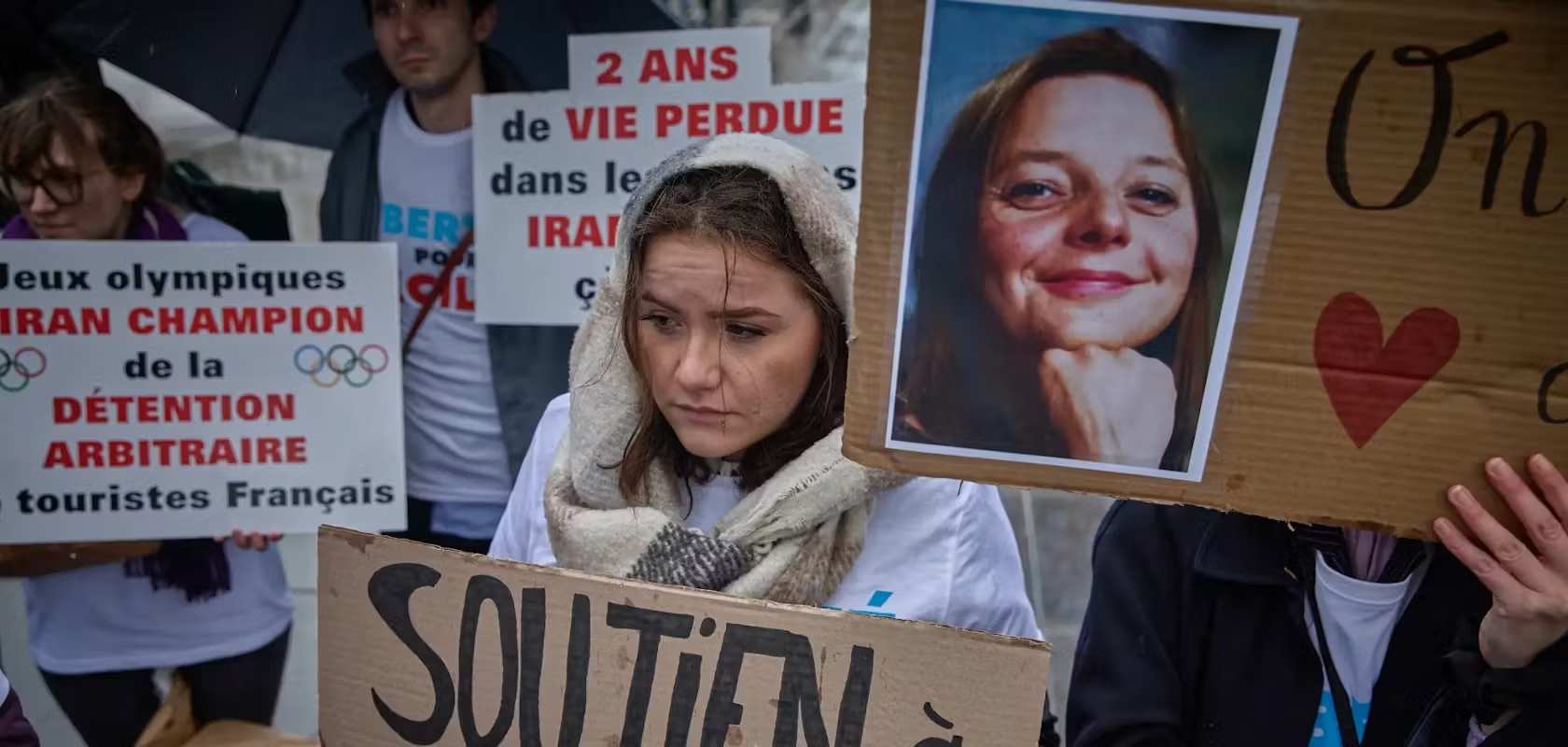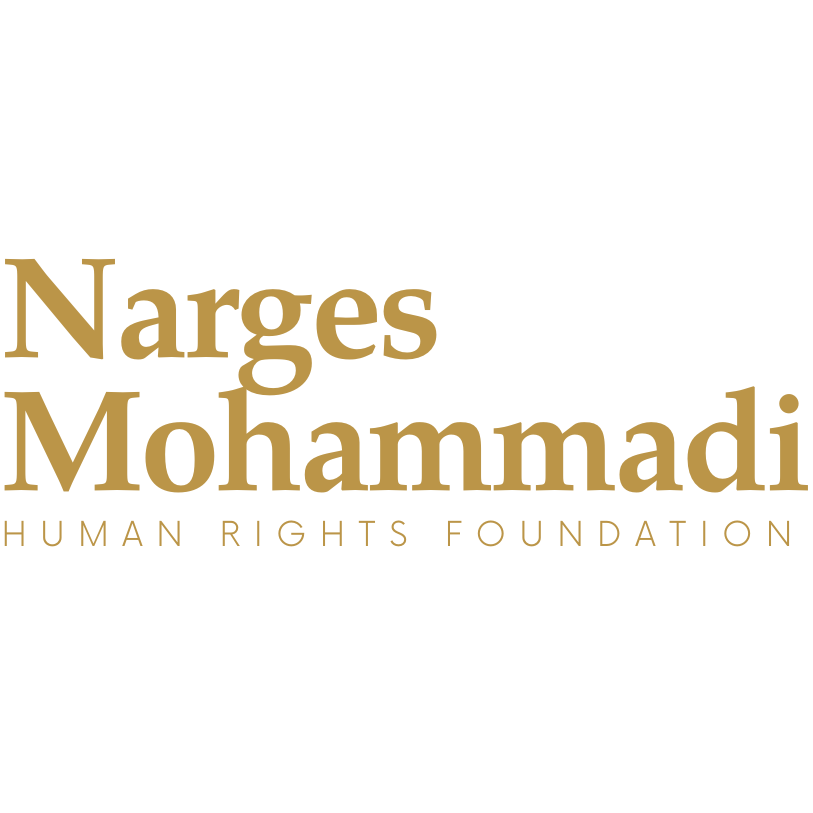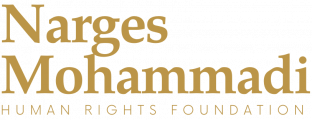
Free Cecile Kohler: Narges Mohammadi Warns of Her Critical Health Risk
Interview with Narges Mohammadi on France Inter – Published January 9, 2025
Question 1
I began my activism during my university years, starting with student movements. We established a collective student group, and it was while working with this group that I was arrested for the first time. Since then, I have been arrested many times and sent to solitary confinement four times.
If I were to count, I have been arrested a total of 13 times since 1380 (2001). I have faced nine trials so far, and there are still a few open cases against me in court that will likely lead to more trials in the future. Remarkably, five of my trials were conducted while I was already in prison.
The Islamic Republic regime hasn’t stopped at stripping me of my civil rights, shutting down the Defenders of Human Rights Center, and closing other NGOs I was involved in. They went as far as trying to silence me behind prison walls. But I didn’t let that happen. In fact, I was so active inside prison that while I faced four convictions for my activities outside, I faced five more for my activism from within.
I have seen my friends arrested and interrogated harshly, often for simply attending gatherings or supporting causes indirectly. Even those who offered minimal assistance—like applauding at events or signing statements—were exposed to the risk of arrest and interrogation. , and I carry a lot of experience from these struggles.
Question 2
After I was released on a suspension of my sentence, my home has never been empty. Every day, political and civil rights activists from different cities and backgrounds came to visit. My home has always been filled with people.
Many activists have reached a point where they no longer fear the consequences of their work. They continue their activism with the awareness that it carries security risks. Their bravery and determination have grown significantly.
It has now been 10 years since I last saw my children, Ali and Kiana. They left Iran while I was in prison in 2015. This is not the first time we have been separated. When they were three and a half years old, I was arrested at 1:00 a.m., even as Kiana was recovering from surgery and had a high fever.
Question 3
The security forces forcibly separated Kiana from me and sent me to solitary confinement. This was one of the most difficult moments of my life. In solitary confinement, I couldn’t stop thinking about how small and dependent Kiana was, her surgery, and her fever.
I kept questioning whether my activism for human rights and women’s rights justified leaving my young daughter alone in such a fragile state. Those moments tested me deeply.
When my children were five and a half years old, and their father was in exile in Paris, I was arrested again. This time was even harder, as their father wasn’t there, and the children no longer had a home. I was sent back to solitary confinement for a long time and later transferred to Zanjan Prison, where, for the first time, I was held among non-political prisoners—those convicted of drug offenses, murder, and other crimes. The atmosphere was deadly.
Question 4
The fight against compulsory hijab in Iran continues in various forms. Brave young women like Ahou Daryaei and Parasto Ahmadi, and many others in the “Woman, Life, Freedom” movement, have taken off their hijabs, burned them, and faced brutal repression. Some were shot and killed by police, while many others lost their eyesight from gunfire.
Despite the immense challenges, Iranian women remain determined to continue their struggle against compulsory hijab laws, which are a cornerstone of the regime’s religious tyranny. This movement goes beyond women’s rights; it is a fight for democracy, equality, and freedom. I firmly believe that democracy without women’s rights is impossible. To dismantle religious tyranny and achieve true democracy, women’s rights must be at the forefront.
Question 5
I never considered leaving Iran. In 1390 (2011), I faced immense pressure from security forces. They wanted me to leave the country illegally through the mountains of Kurdistan. I refused, and the price I paid for that decision was high. I endured interrogations in solitary confinement as they repeatedly pushed me to leave, both directly and indirectly, but I stood my ground.
Even during my imprisonment, they tried to persuade me to leave, but I always said no. I insist on staying among the people of Iran, standing with them every step of the way.
Question 6
Regarding Ahou Daryaei, I have no news of her, but about Cécile Kohler, I know that she is being held in the infamous Ward 209, a security ward. When I was in the general ward of Evin Prison, I often asked those who had been in the solitary cells of Ward 209 and were later transferred to our ward about Cécile. She is being kept in Ward 209 of the Ministry of Intelligence, a highly notorious security ward. I would ask my cellmates if they had seen Cécile or heard anything about her.
Some of my cellmates had briefly shared a cell with Cécile and said that she was in very poor physical condition, extremely weak, and in a very bad state. I am genuinely worried about her. I myself have been in those solitary cells before.
When I was there, access to fresh air was allowed only three times a week, and each time for just 20 minutes. I know the doors of those cells remain locked 24 hours a day, except for trips to the restroom or for interrogations. These long periods in a small cell without light, air, or movement have a devastating impact on a person’s health. These few factors alone are enough to endanger someone’s well-being.
It is an isolated and confined environment, and this prolonged isolation can put immense psychological and emotional pressure on an individual, as well as threaten their physical health. This is a good opportunity to express my grave concern about the mental and physical consequences of solitary confinement and white torture on Cécile’s health. Being held in solitary confinement for such an extended period is unimaginable and beyond belief.
Narges Mohammadi
France Inter Radio
9th Jan 2025
گفتگو نرگس محمدی با رادیو فرانس اینتر – ۱۹ دی ۱۴۰۳
من مبارزاتم را از جنبش دانشجویی آغاز کردم. در سالهای اول ورودم به دانشگاه، تشکل دانشجویی را تأسیس کردیم و اولین بازداشت من نیز به دلیل فعالیتهای دانشجویی بود. بعد از آن، بارها بازداشت شدم. چهار بار به سلول انفرادی رفتم و سیزده بار بازداشت شدم که همه این موارد مربوط به سالهای اخیر بوده است، یعنی از سال ۱۳۸۸ به بعد. تاکنون نه بار محاکمه شدهام و همچنان پروندههای بازی در دادسرا دارم که بابت آنها محاکمه خواهم شد.
جالب است بدانید که پنج مورد از محاکمات من زمانی انجام شد که داخل زندان بودم. جمهوری اسلامی علاوه بر اخراج و محرومیت من از حقوق شهروندی، تعطیل کردن دفاتر فعالیتهایم در کانون مدافعان حقوق بشر و سایر نهادهایی که در آنها فعالیت میکردم، تلاش کرد از طریق دیوارهای زندان من را ساکت کند. اما نه تنها موفق نشد، بلکه در داخل زندان هم آنچنان فعالیت کردم که چهار بار محاکمه و محکوم شدم.
در تجمعات سالهای گذشته بارها شاهد بودم که دوستانم بعد از بازداشت و محاکمه تحت فشارهای شدید قرار گرفتند. حتی افرادی که نقشی غیرمستقیم در این تجمعات یا تحصنها داشتند، مورد بازجوییهای آسیبزا قرار گرفتند. باوجود همه اینها، از روزی که برای توقف حکم به خانه برگشتم، تقریباً هیچ روزی نبوده که این خانه خالی از فعالان سیاسی و مدنی از شهرهای مختلف نباشد.
ده سال است که علی و کیانا، فرزندانم، را ندیدهام. آنها زمانی که من در زندان بودم، ایران را ترک کردند. البته قبل از آن هم جدا ماندنهایی داشتیم. به یاد دارم زمانی که علی و کیانا سه سال و نیمه بودند، ساعت یک شب بازداشت شدم. حتی وقتی کیانا بعد از عمل جراحی سختی در تب میسوخت، مأموران امنیتی او را از آغوش من جدا کردند و من را به سلول انفرادی بردند.
سختترین لحظه عمرم زمانی بود که در سلول انفرادی بودم و میدانستم کیانا که هنوز کوچک بود و به من وابسته، بهتازگی از یک عمل جراحی سخت به خانه برگشته است. این لحظهها شاید تنها زمانی بود که در مبارزاتم تردید کردم.
وقتی بچهها پنج سال و نیمه بودند و پدرشان در ایران نبود، باز هم بازداشت شدم. این بار شرایط برایم سختتر بود، چون هیچ سرپرستی برای بچهها وجود نداشت. بعد از انتقال به زندان عمومی زنجان، با محیط و زندانیانی مواجه شدم که برایم کاملاً جدید و دشوار بود؛ زندانیانی با جرایم سرقت، مواد مخدر و قتل.
مبارزه با حجاب اجباری به اشکال مختلف در جامعه ایران جریان دارد. زنان ایران تصمیم گرفتهاند تا لغو حجاب اجباری بهعنوان یکی از پایههای اصلی نظام استبدادی دینی، به مبارزات خود ادامه دهند. این مسئله نه فقط در راستای حقوق زنان، بلکه بهعنوان بخشی از مبارزه برای دموکراسی و آزادی قابل تحلیل است.
من هرگز به ترک ایران فکر نکردهام. حتی در سال ۱۳۹۰، وقتی تحت فشار شدید نیروهای امنیتی قرار گرفتم و آنها از من خواستند بهصورت غیرقانونی از کوههای کردستان از ایران خارج شوم، این درخواست را نپذیرفتم. تاوان این تصمیم سنگین بود؛ بارها در سلول انفرادی و بازجویی به خاطر این موضوع تحت فشار قرار گرفتم. اما همچنان مصمم هستم که در کنار مردم ایران و برای حقوق آنها مبارزه کنم.
در رابطه با آهو دریایی متاسفانه از او خبری ندارم، اما در مورد سسیل میدانم که در بند بد نام امنیتی ۲۰۹ وزارت اطلاعات نگهداری میشود. زمانی که در بند عمومی زندان اوین بودم، بارها از کسانی که در سلولهای انفرادی ۲۰۹ بودند و بعد به بند ما منتقل شده بودند، درباره سسیل سؤال کردم، کسانی که مدت کوتاهی هم سلولی او شده بودند. از همبندیها میپرسیدم که آیا سسیل را دیدهاند یا خبری از او دارند؟
آنها میگفتند که او از نظر جسمی بسیار ضعیف شده و در وضعیت بسیار بدی قرار دارد. من واقعاً نگران او هستم. خودم هم قبلاً در این سلولهای انفرادی بوده ام.
زمانی که در آنجا بودم، دسترسی به هواخوری فقط سه بار در هفته و هر بار فقط ۲۰ دقیقه بود. میدانم که درب این سلولها ۲۴ ساعته بسته است، مگر برای رفتن به سرویس بهداشتی و یا هواخوری با اجازه بازجو…این شرایط ایزوله کردن یک انسان در طولانیمدت بدون نور، بدون هوا و بدون تحرک در یک سلول کوچک اثرات وحشتناکی بر سلامت افراد میگذارد. همین چند عامل بهتنهایی میتواند سلامتی یک فرد را به خطر بیندازد.
سلول انفرادی محیطی ایزوله و بسته است و این ایزوله بودن طولانیمدت میتواند فرد را تحت فشار روانی و روحی قرار دهد و همچنین سلامت جسمی او را به خطر بیندازد. این فرصت خوبی است که اعلام کنم که عواقب روحی و جسمی سلول انفرادی و شکنجه سفید نگران کننده است و من به شدت نگران سلامتی روحی و جسمی سسیل هستم. این مدت طولانی در سلول انفرادی بودن، غیرقابل تصور و غیرقابل باور است.


